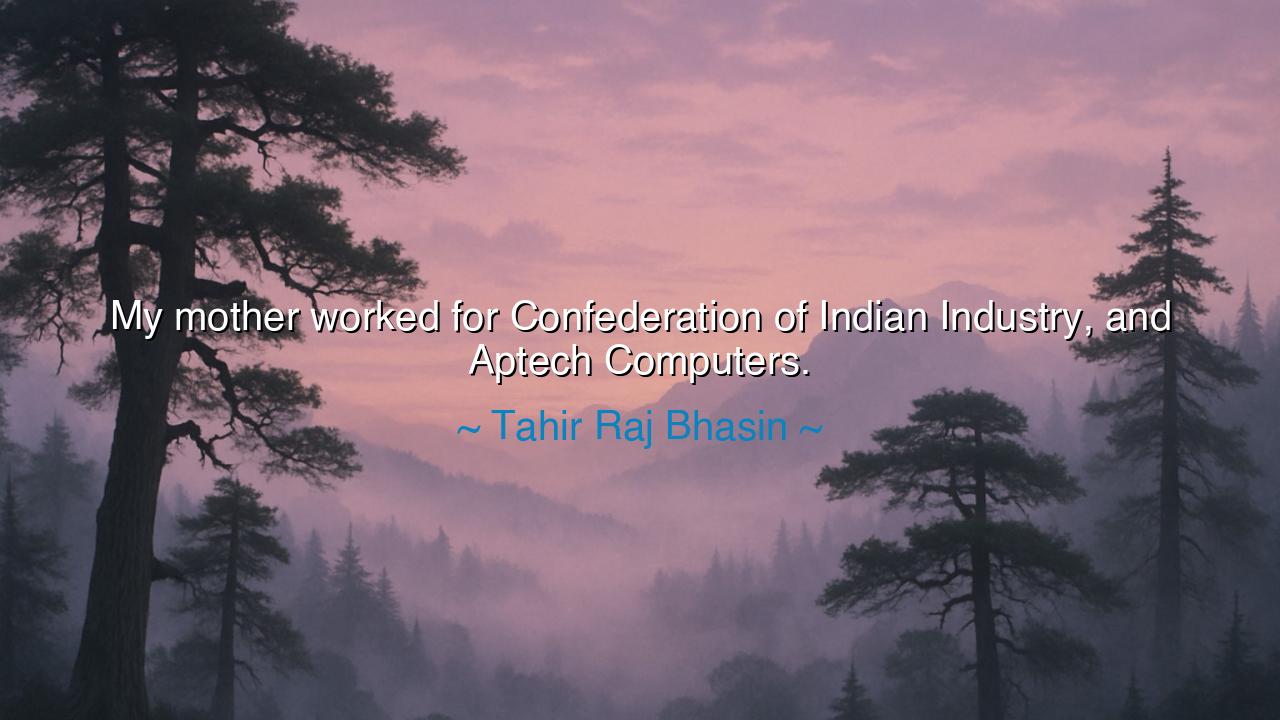
My mother worked for Confederation of Indian Industry, and Aptech






In the grand tapestry of life, there are moments when the words of an individual—spoken with the simplicity of reflection—reveal profound truths about the paths we walk and the influences that shape our destinies. The words of Tahir Raj Bhasin, "My mother worked for the Confederation of Indian Industry, and Aptech Computers," while seemingly straightforward, carry with them the weight of history, of generational shifts, and of the impact that family and work have on the formation of one's character and purpose.
To understand the deeper meaning of Tahir Raj Bhasin's words, we must first reflect on the role of work in the shaping of human identity. In the ancient world, work was not just a means of sustenance; it was a calling, a way of participating in the ongoing creation of society. The Greeks saw work as an extension of virtue—a way of expressing one's essence through the craft one pursued. The great Athenian philosopher Socrates believed that a person’s work should reflect their inner character, and that a life of integrity in work was the highest form of honor. In the same light, Tahir Raj Bhasin's mention of his mother’s work at such distinguished organizations reflects not only her professional journey but also her influence on the next generation—shaping her son’s worldview, his sense of responsibility, and his understanding of commitment.
The Confederation of Indian Industry (CII), a powerful institution that has long been at the forefront of economic development in India, speaks to the era of modernization and industrial growth in the country. Similarly, Aptech Computers, a company that played a pivotal role in educational technology and computer training, represents the march of progress, where technology shapes the very fabric of society. To have one's mother work for such organizations is to be intertwined with the pulse of change, to witness firsthand the transition of a society from tradition to modernity, from an industrial economy to one that thrives on innovation and technology.
Let us now turn our gaze to the story of Gandhi, who, much like Bhasin's mother, became intimately acquainted with the evolving landscape of India during his life. Gandhi’s deep commitment to the spiritual and economic transformation of his people led him to embrace various forms of labor—not just as an individual pursuit, but as a collective force for change. His efforts were not just about individual freedom but about empowering a nation to take control of its destiny. Gandhi’s own relationship with work—be it in the fields or in the offices of the Indian National Congress—was a reflection of his belief that every person’s contribution, no matter how seemingly small, was part of the greater tapestry of progress.
In the context of Tahir Raj Bhasin, his mother’s work for such organizations symbolizes not just a personal achievement, but an alignment with the forces that shaped modern India—a country that has transitioned from post-colonial uncertainty to a global economic powerhouse. The work done by his mother in these institutions speaks to the dynamic role that women have played in the economic and social development of the country. Her efforts, though perhaps unsung, were as integral to the progress of India as the technological revolutions ushered in by the very companies she served.
This brings us to a deeper lesson for all of us: work is never just about earning a living, but about participating in a greater narrative. Every task, no matter how mundane it may seem, is part of a larger story—one that connects us to the generations that came before us and those that will follow. Just as Tahir Raj Bhasin carries the legacy of his mother’s work within him, so too do we all carry the seeds of the labor we perform in the present. It is through our work that we shape not only our own destinies but also contribute to the greater good of society.
Therefore, the lesson we must take from Tahir Raj Bhasin's reflection is that our work is never just for ourselves. It is a part of the collective whole, and the contributions we make today will shape the future of generations to come. Whether in the field of technology, education, or industry, we must recognize the profound impact our efforts can have—not just on our own lives, but on the lives of others. In doing so, we can aspire to a life where work is not just a task to be completed, but a means of transforming the world, just as the legacy of Bhasin’s mother and many others has done. Let us find meaning and purpose in every action we take, knowing that in the end, our work will help to build the world that future generations will inherit.






AAdministratorAdministrator
Welcome, honored guests. Please leave a comment, we will respond soon